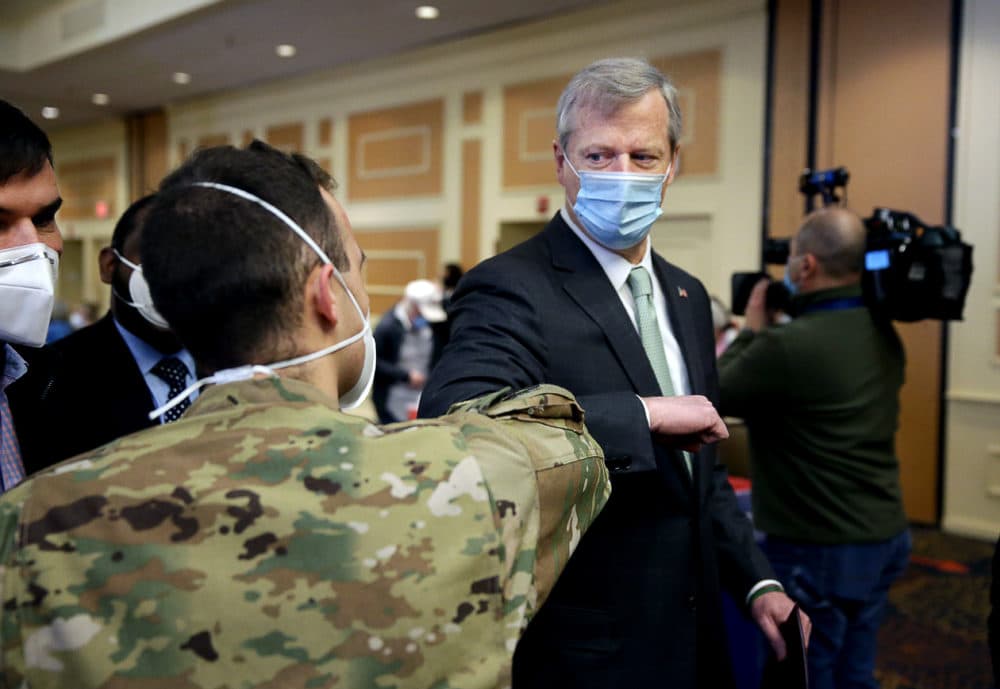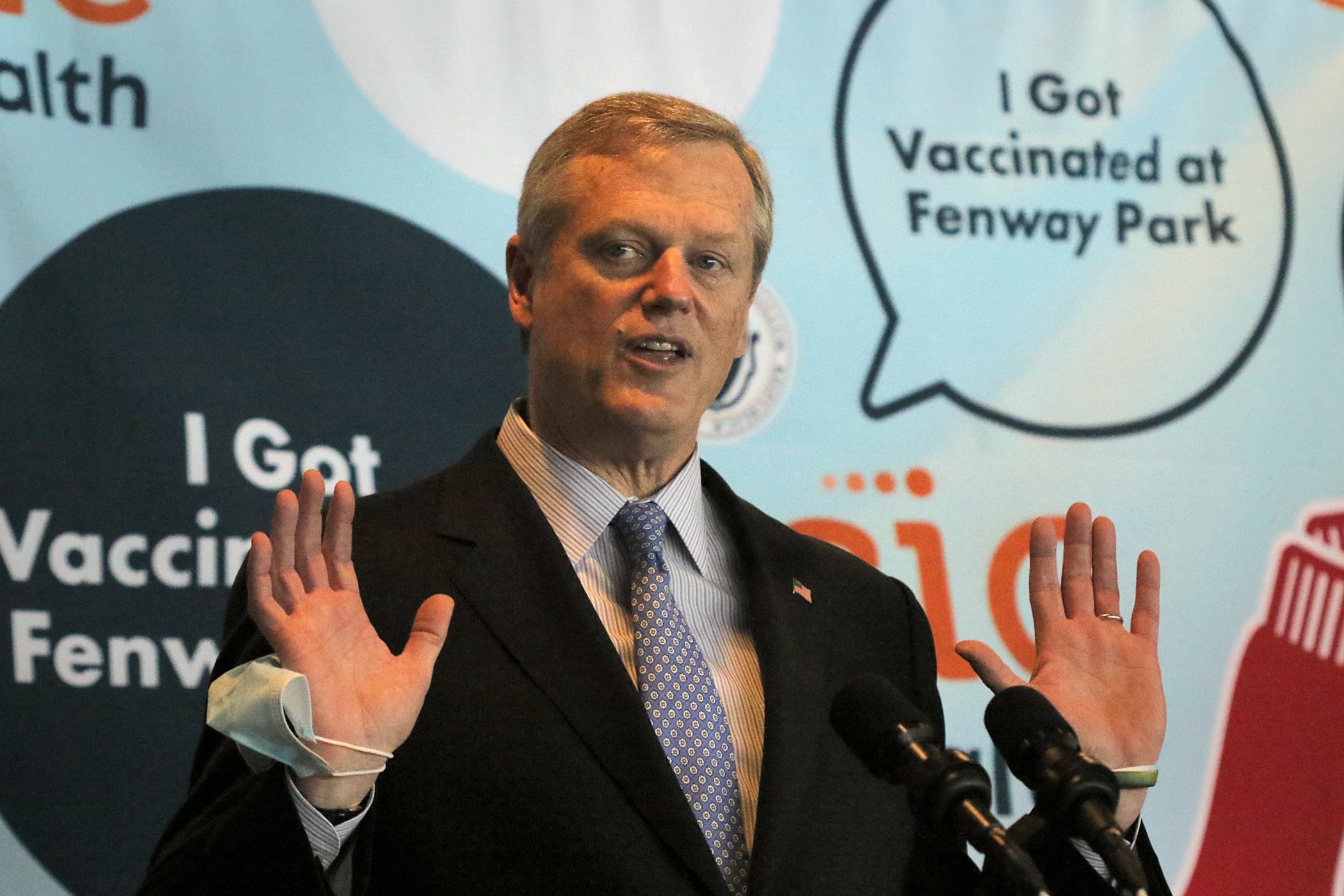Advertisement
Commentary
Charlie Baker Has Made Plenty Of Mistakes. Why Is He Still So Popular?

Politically speaking, Massachusetts is a jumble of contradictions. This very blue state has become even bluer. Hillary Clinton trounced Donald Trump here in 2016, winning 61% of the vote, but in 2020, Joe Biden won an even bigger landslide with more than 65%. There is no shortage of woes for the state’s Republican Party. In the State Senate, GOP membership has dropped to just three senators (out of 40).
And yet, after more than six years in office, Republican Gov. Charlie Baker remains immensely popular. Not only is he broadly admired, but his mistakes and failures never seem to dent his popularity — he’s Teflon Charlie. With the 2022 governor’s race on the horizon, Baker is a heavy favorite if he chooses to run for a third term.
Why has this governor sailed so effortlessly through his time in office? Moreover, what does this tell us about Massachusetts politics?
Measurement of popularity — whether survey respondents approve or disapprove of a politician’s performance in office — is a bit of a blunt instrument. However, gubernatorial approval scores are valuable because they allow comparisons both over time and across all 50 incumbents. Baker has typically registered above 70% approval, an extremely high score, and at times, polls have shown him to be the country's most popular governor. Most startling, perhaps, is a University of Massachusetts Lowell poll in May 2020 that showed that 89% of likely Democratic primary voters approved of the job Baker is doing.

Among all the factors that might structure the public’s opinion of Baker, two stand out. First, the state’s economy is strong. Both the unemployment rate and growth in personal income are better than the national average, while state GDP is similar to the overall U.S. rate. The development of the life sciences industry and the building boom in Boston and Cambridge are just some of the reasons for optimism about the state’s future.
Second, Baker’s liberalism on social issues fits the state’s political profile well and disarms a lot of potential critics of a Republican leader. He has been a steadfast and early supporter of gay rights and signed a transgender rights bill in 2016. He is equally supportive of abortion rights. Baker has invested political capital in a program to fight opioid addiction, not an issue likely to pay much in the way of dividends at the ballot box. He is clearly more of a moderate on economic issues, but this has played well with the state’s independent voters, 56% of the total Massachusetts electorate.
Yet there are many problems facing the state that Baker has handled poorly or not paid sufficient attention to. First and foremost is the rollout of COVID vaccines. Given Baker’s background in healthcare administration, one might think that the pandemic would be an opportunity for him to show off his managerial skills. But the state floundered right out of the gate, despite the many months it had to plan the vaccination sites and develop the processes for making appointments. Last week, as residents 65 and older could first book shots, the state's vaccine finder website crashed and remained dysfunctional all day.
Given Baker’s background in healthcare administration, one might think that the pandemic would be an opportunity for him to show off his managerial skills.
A recent study by Harvard’s Kennedy School graded the state’s performance on COVID and vaccines along four dimensions, awarding it three F’s and a D. “Many of these deaths probably would not have occurred if the Baker administration and Legislature had taken actions they could have — but failed to take, such as protecting senior citizens since they account for 80% of the deaths," the authors concluded in The Boston Globe.
Baker has stumbled in other areas as well. He has treated chronic MBTA failings as strictly management matters, ignoring serious capacity issues, and generally, he’s demonstrated a real failure of imagination on transportation. An example is the state’s need to restructure a deteriorating stretch of the Mass Pike in Allston. It presents an opportunity to enhance many different types of transportation that intersect in this complicated parcel along the Charles River. After years of study, Baker recently reached a decision — a decision not to move forward, but to think about it some more.
Despite his shortcomings on these issues as well as on others, Baker’s standing with the public remains undiminished. A testament to his strength is that none of the most popular Democrats in the state, such as Maura Healey or Ayanna Pressley, have signaled any interest in challenging Baker in 2022.
Baker is truly Teflon Charlie; problems seem to bounce off him harmlessly.
Baker is truly Teflon Charlie; problems seem to bounce off him harmlessly. Beyond his moderation and the state’s strong economy, I believe that there are three other reasons why Baker is thriving at a stratospheric level of approval.
In a perverse way, Baker benefits from the state being so strongly Democratic. Since there are few Republicans in the state legislature, Democrats have veto-proof margins and could direct state policy by themselves, if they chose to. Thus, Baker has little choice but to be collaborative. Democrats are less the opposition party than the partner party.
Relatedly, Democrats in the Legislature seem happy with this arrangement. In states like Wisconsin, Pennsylvania, Michigan and North Carolina, where control of the Legislature and executive branch is divided, politics is highly contentious. Part of politics is tearing down the other side, but these days, Massachusetts marches to the beat of its own genteel drum. The newly elected Democratic Speaker of the House, Ronald Mariano, said admiringly of Baker, “He’s probably worked with the Legislature better than any governor.” Baker and Mariano are bros, not enemies.
Finally, Baker has mastered being the non-political politician. He exudes moderation and borderline nerdiness, while his lack of conservative ardor angers many rank-and-file of his own party. In the 2018 Republican primary, his conservative challenger, Scott Lively, who had no money and little organization, won a surprising 36% of the vote. Baker’s base is not the state’s GOP, however, but independents. This allows him great freedom.
Baker’s own formula does not seem to translate well to other states, but he’s killing it in Massachusetts.
